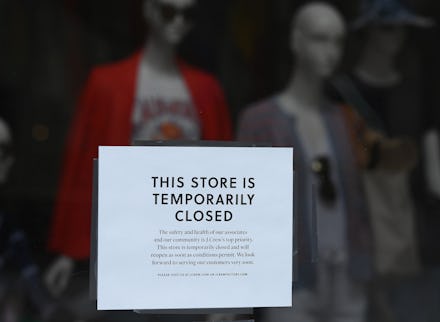Unemployment in the U.S. is now the highest it's been since the Great Depression

The coronavirus pandemic's strain on the economy isn't showing signs of letting up. In March, a number of states were already struggling as unemployment claims skyrocketed within a week. Now, new data released Friday shows that U.S. unemployment hit nearly 15% in April and experts predict those numbers will continue to climb.
The Bureau of Labor Statistics released its jobs report for the month of April on Friday, which found unemployment last month reached 14.7%. That's a significant leap compared to 4.4% in March and is the highest unemployment rate since the Great Depression. The report also notes that the economy lost 20.5 million jobs in April.
To put that into perspective, the economy has added 22.4 million jobs total since the Great Recession, according to The Hill. Not only are the job losses due to the coronavirus pandemic almost equivalent to a decade's worth of growth, but The Hill reported that the number of jobs lost in April alone are almost 2.5 times the 8.7 million jobs lost during the entire Great Recession.
While the BLS found unemployment rose among all major worker groups, not everyone was impacted the same. Unemployment is higher for adult women compared to adult men at 15.5% and 13.0% respectively. In addition, race plays a role, with 16.7% of Black people and 18.9% of Latinos unemployed compared to 14.2% of white people. These unemployment numbers are record highs for every single group except Black people.
You shouldn't expect to see these numbers improve in the next month, either. On Friday, White House senior economic adviser Kevin Hassett told CNN's Poppy Harlow that the official unemployment rate will likely hit 20% in May. However, Hassett also said that the United States will likely enter a "transition period" this summer where unemployment will fall.
During a phone interview with Fox News, Trump said the numbers were "fully expected. There's no surprise. Everybody knows that." Trump also vowed to "bring them back," which is no surprise given his current push to reopen businesses across the country — likely sacrificing public health in the process.
States like Georgia, Texas, and Tennessee have all relaxed their social distancing restrictions. However, many caution that the United States isn't testing enough to make reopening safe. During a hearing Thursday, Sen. Lamar Alexander (R-Tenn.), chairman of the Senate's Health, Education, Labor, and Pensions Committee, said the over 7 million tests run to date are "impressive, but not nearly enough."
These concerns are backed by the federal government's own predictions. Last month, the Center for Public Integrity, an investigative nonprofit, obtained documents that show if social distancing guidelines are lifted too early, the coronavirus could kill over 300,000 people. Yet despite these concerns, Trump says doing too much testing would make the U.S. "look bad".
When it comes to managing the coronavirus, testing — or the lack thereof — is only one part of the problem. Sen. Patty Murray (D-Wash.) said, "The problem isn’t a lack of innovation, it’s a lack of national leadership and a plan from the White House.”
Murray continued: “You can innovate the fastest car in the world — it still won’t get you where you’re going without a good driver and good directions.”